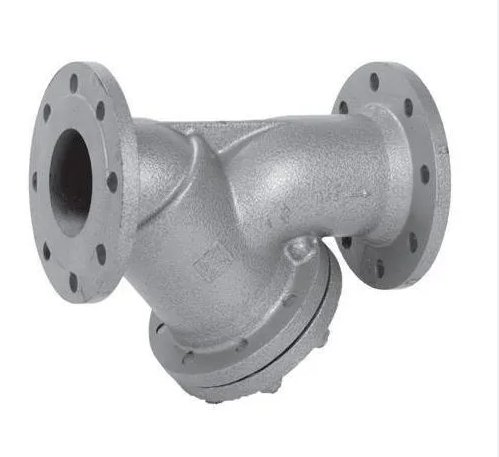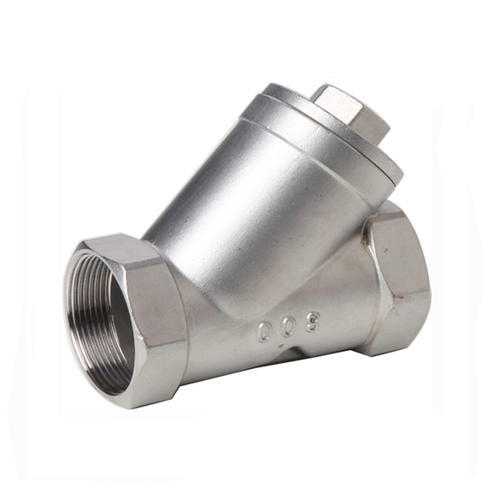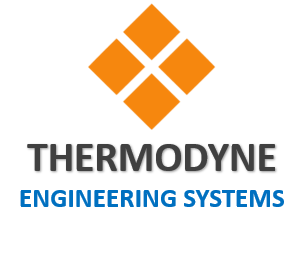Table of Contents
Y-Type Strainers: Protecting Steam Boilers
A Y-type strainer is a device that is used to mechanically remove unwanted solids from liquid, gas, or steam lines. It is typically made of cast iron (CI) and has a Y-shaped body. The strainer element is located in the body of the strainer and is made of a perforated or wire mesh material. The size of the perforations or mesh determines the size of the solids that the strainer can remove.
Y-type strainers are commonly used in Steam boilers to protect pumps, meters, control valves, steam traps, regulators, and other process equipment from damage caused by unwanted solids. The strainer element traps the solids and prevents them from entering the downstream equipment. This helps to prolong the lifespan of the equipment and minimizes costly downtime.

.
In industrial settings, the efficient operation of boilers and process equipment is crucial for maintaining productivity and preventing costly downtime. Y-type strainers play a vital role in this process by protecting pumps, meters, control valves, steam traps, regulators, and other process equipment from damage caused by unwanted solids. By effectively trapping and preventing the entry of these solids into downstream equipment, Y-type strainers help prolong the lifespan of the equipment and minimize the risk of failure. In this article, we will delve into the details of Y-type strainers, their benefits, and why they are essential for any boiler system.
What are Y-Type Strainers?
Y-type strainers are robust and versatile devices designed to remove unwanted solids from process fluids, ensuring the smooth and uninterrupted operation of various equipment. They derive their name from their shape, which resembles the letter “Y.” These strainers are typically installed in pipelines and are known for their simple yet effective design.
The Purpose of Y-Type Strainers
Y-type strainers act as an initial line of defense, capturing solid particles such as debris, rust, scale, and other contaminants present in the process fluid. By doing so, they prevent these particles from causing damage to downstream equipment, including pumps, meters, control valves, steam traps, regulators, and more.
Key Features and Design
Y-type strainers feature a compact design that makes them easy to install in pipelines. They consist of a housing or body, a removable strainer element, and a cover or cap. The strainer element, which is typically made of stainless steel or other corrosion-resistant materials, is the primary component responsible for capturing the unwanted solids. The housing is designed to ensure a proper flow of the process fluid, while the cover allows for easy access to the strainer element during maintenance and cleaning procedures.
Strainer Element Options
Y-type strainers offer various strainer element options to accommodate different process requirements and applications. Common strainer element materials include stainless steel, brass, and cast iron. The mesh size of the strainer element can be customized based on the particle size that needs to be filtered out. Fine mesh is suitable for applications where smaller particles need to be captured, while larger mesh sizes can handle larger solid contaminants.
Installation and Maintenance
Proper installation and regular maintenance of Y-type strainers are essential for optimal performance and longevity. During installation, it is crucial to position the strainer in a way that allows easy access for cleaning and replacement of the strainer element. Routine maintenance involves inspecting the strainer element for signs of wear or damage, cleaning it to remove accumulated solids, and replacing it if necessary. Additionally, regular inspection of the housing and cover for leaks or corrosion is recommended.
Benefits of Y-Type Strainers
- Equipment Protection: Y-type strainers play a critical role in safeguarding process equipment from damage caused by solid contaminants. By preventing unwanted solids from entering pumps, meters, control valves, and other equipment, they help extend the lifespan of these components, reduce maintenance costs, and minimize costly downtime.
- Improved Efficiency: By removing solid particles from the process fluid, Y-type strainers promote smoother and more efficient operation of boilers and other equipment. Unobstructed flow reduces pressure drop and ensures consistent performance, optimizing energy consumption and overall system efficiency.
- Process Integrity: Y-type strainers maintain the integrity of the process by preventing solid particles from interfering with the function of downstream equipment. By filtering out contaminants, they help ensure the quality and reliability of the end product.
- Cost Savings: The use of Y-type strainers can result in substantial cost savings over time. By preventing equipment damage and reducing the need for frequent repairs or replacements, they help companies avoid costly downtime and improve the overall return on investment.
Y-type strainers are indispensable components in boiler systems and industrial processes. Their ability to effectively trap unwanted solids and protect downstream equipment is paramount for maintaining productivity and minimizing costly disruptions. By investing in high-quality Y-type strainers, businesses can ensure the long-term reliability and performance of their boilers and process equipment.

Unparalleled Efficiency and Ease of Maintenance
Our Y-Strainers are designed to maximize efficiency and streamline maintenance processes, enabling you to optimize productivity and minimize operational costs. The strategic placement of Y-Strainers within your pipeline network ensures that impurities are captured at the earliest possible stage, preventing potential damage to downstream equipment. Additionally, our Y-Strainers feature user-friendly designs that facilitate swift and straightforward maintenance operations, allowing you to minimize downtime and enhance overall system performance.
Partnering for Success
When it comes to ensuring the reliability and efficiency of your fluid handling systems, partnering with the right supplier is crucial. At Thermodyne Engineering System we go the extra mile to deliver exceptional value to our customers. With our extensive industry expertise, unwavering commitment to quality, and unparalleled customer service, we are the preferred choice for businesses seeking top-of-the-line Y-Strainers. Discover how our cutting-edge solutions can elevate your fluid filtration processes and drive your success to new heights.
Y-Strainers are devices for mechanically removing unwanted solids from liquid, gas or steam lines by means of a perforated or wire mesh straining element.
They are used in pipelines to protect pumps, meters, control valves, steam traps, regulators and other process equipment. These Strainers are furnished with high quality. We offer a wide variety of strainers that help ensure economical trouble-free service.
Y-Type Strainers Protecting Steam Boilers FAQ
A Y type strainer is a type of strainer that is commonly used in Steam boilers. It is named for its Y-shaped design, which allows for the easy removal of sediment and other contaminants from the fluid flow.
A CI strainer is a strainer that is made of cast iron. It is a durable and corrosion-resistant material that is well-suited for use in Industrial steam boilers.
A boilers strainer is a type of strainer that is specifically designed for use in steam boilers. It is used to remove sediment and other contaminants from the boiler water, which helps to protect the boiler from damage.
The purpose of a strainer in a Steam boilers is to remove sediment and other contaminants from the boiler water. This helps to protect the boiler from damage, and it also helps to ensure that the boiler water is clean and free of contaminants.
The different types of strainers used in boilers include Y type strainers, basket strainers, and disc strainers. Y type strainers are the most common type of strainer used in boilers. Basket strainers are also commonly used, and they are typically used in larger boilers. Disc strainers are less common, but they are often used in Industrial boiler that operate at high pressures.
The frequency with which a boiler strainer should be changed depends on the type of strainer and the operating conditions of the boiler. However, it is generally recommended that boiler strainers be changed every 6 months to 1 year.
There are a few signs that a boiler strainer needs to be changed. These signs include:
The boiler water is not as clear as it used to be
The boiler is not producing as much steam as it used to
The boiler is making more noise than it used to
The boiler is overheating
If a boiler strainer is not changed, there are a number of risks that can occur. These risks include:
The boiler can become damaged
The boiler can overheat
The boiler can produce less steam
The boiler can become more expensive to operate
When choosing a boiler strainer, there are a number of factors to consider, including:
The size of the boiler
The operating pressure of the boiler
The type of fluid that will be flowing through the strainer
The desired level of filtration
Boiler strainers can be purchased from a number of different sources, including online retailers, plumbing supply stores, and industrial supply stores.
Buy Boiler Spare Parts at the Best Price
Thermodyne Boilers supplies 100+ Industrial Boiler Parts all over India. Contact our sales team & send your requirement to get prices & discounts
